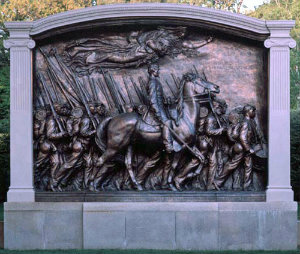Summary | Excerpt | Reviews | Beyond the Book | Read-Alikes | Genres & Themes | Author Bio

This article relates to Five-Carat Soul
In "Father Abe," a short story in Five-Carat Soul, McBride mentions two all-black regiments that fought for the Union army during the Civil War — the 32nd United States Colored Infantry and the 9th Louisiana Colored Infantry.
 When war broke out in 1861, African Americans were barred from serving, but this rule was set aside by the passage of the Second Confiscation and Militia Act and the Emancipation Proclamation in 1862. Over the course of the war, 179,000 African-American men served in upwards of 160 units. One of the first regiments was the all-black Massachusetts 54th, formed in February 1863, led by Colonel Robert Gould Shaw, a white man.
When war broke out in 1861, African Americans were barred from serving, but this rule was set aside by the passage of the Second Confiscation and Militia Act and the Emancipation Proclamation in 1862. Over the course of the war, 179,000 African-American men served in upwards of 160 units. One of the first regiments was the all-black Massachusetts 54th, formed in February 1863, led by Colonel Robert Gould Shaw, a white man.
This regiment is known for its courageous (but disastrous) attack on the Port of Charleston in South Carolina. Charles and Lewis Douglass, sons of Frederick Douglass, served in this unit, which is also the subject of the acclaimed 1989 film Glory. Many Union soldiers' lives were lost at the Port of Charleston battle, and the fort there, Fort Wagner, was so damaged that the Confederate troops abandoned it shortly thereafter. African American troops also played a substantial role in the Battle of the Crater in Virginia, and the Battle of Nashville.
The Louisiana 1st Native Guard (also called the Corps d'Afrique) was another early-formed all-black regiment, made up of free African American men from the North and escaped slaves from the surrounding southern states. The Louisiana 1st took part in two separate attacks on nearby Port Hudson. The victory of the second battle was a major turning point in the war. The first black governor of Louisiana, Pickney Benton Steward Pinchback, served in this unit.
 Black soldiers were paid $3 per week less than their white counterparts, and faced additional dangers, as they were more likely to be enslaved or executed on the spot if captured by Confederate forces.
Black soldiers were paid $3 per week less than their white counterparts, and faced additional dangers, as they were more likely to be enslaved or executed on the spot if captured by Confederate forces.
In addition to fighting, African-Americans, including escaped slaves, provided valuable intel to the Union army. Harriet Tubman is perhaps the most famous African American to serve as a spy during the Civil War, and even took part in an 1863 raid near Beaufort, South Carolina, making her the first woman in U.S history to lead a military expedition. Tubman destroyed Confederate supplies and property during the raid, and she and the troops rescued 700 escaping slaves (some of whom would go on to serve in the Union army).
Unsurprisingly, black soldiers played less of a role on the Confederate side of the Civil War, despite legislation passed in 1865 claiming that slaves could earn their freedom by enlisting in the army.
Picture of Memorial to Robert Gould Shaw and the 54th Massachusetts Volunteer Infantry Regiment by Augustus Saint-Gaudens from United States National Park Service
Picture of Harriet Tubman from Library of Congress
Filed under People, Eras & Events
![]() This "beyond the book article" relates to Five-Carat Soul. It originally ran in October 2017 and has been updated for the
September 2018 paperback edition.
Go to magazine.
This "beyond the book article" relates to Five-Carat Soul. It originally ran in October 2017 and has been updated for the
September 2018 paperback edition.
Go to magazine.
Your guide toexceptional books
BookBrowse seeks out and recommends the best in contemporary fiction and nonfiction—books that not only engage and entertain but also deepen our understanding of ourselves and the world around us.